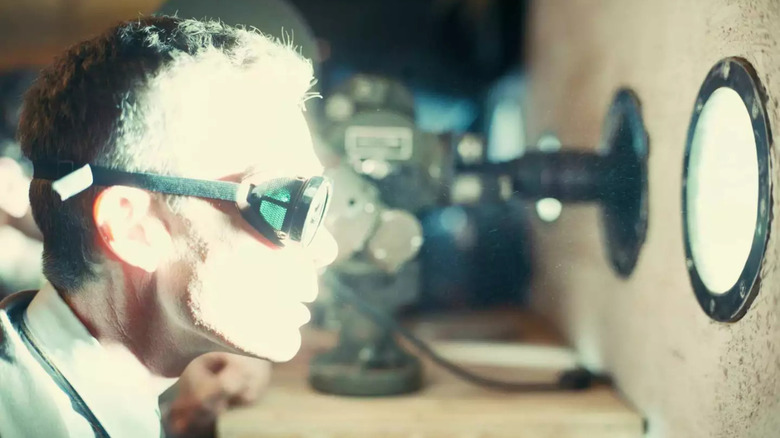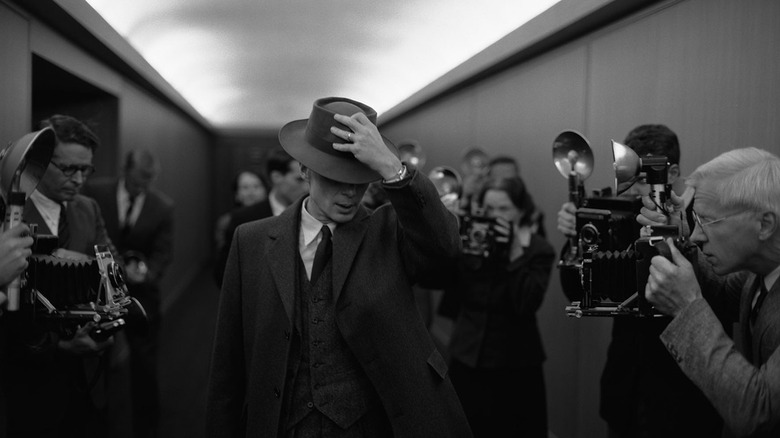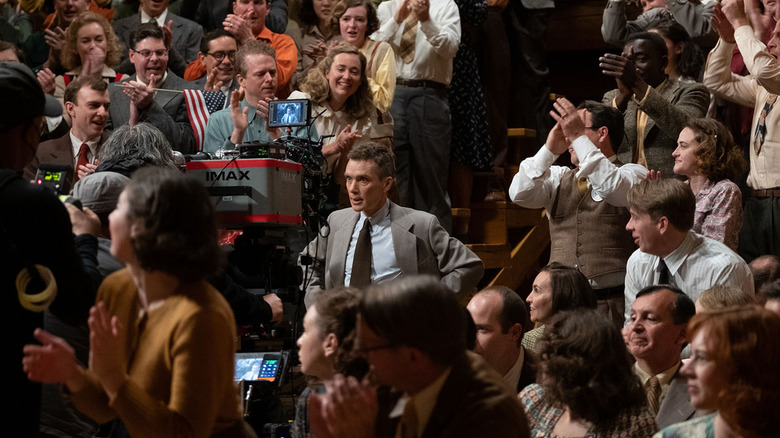Ludwig Göransson's Oppenheimer Score Came Together In Just Five Days
The stirring score for "Oppenheimer" is undoubtedly one of the most crucial aspects to director Christopher Nolan's thrilling epic about the father of the atomic bomb. Composed by Swedish wunderkind Ludwig Göransson, the intensity of the music captures the swirling thoughts and anxieties occurring inside the overly active mind of one of the 20th centuries greatest geniuses, while still conjuring up the booming themes and anthemic pulses that audiences have come to expect from Nolan's filmography.
After "Tenet," this marks the second collaboration between Göransson and Nolan after composer Hans Zimmer chose to work on Denis Vileneuve's sci-fi reimagining of "Dune" following seven films with Nolan, including "The Dark Knight" (alongside James Newton Howard), "Interstellar," and "Dunkirk." Unlike Batman, there is no heroic theme for J. Robert Oppenheimer (Cillian Murphy), and the signature "Braaam" sound featured in Zimmer's pounding soundtracks is noticeably absent here.
Clocking in at a crisp but challenging three hours, "Oppenheimer" is Nolan's most ambitious film to date. In almost all of his films, the music is a constant presence that swells at just the right time to add weight and circumstance to moments that otherwise wouldn't have the same emotional effect, like a spinning top during the crescendo of "Inception."
The challenge for Göransson was having to match Nolan's level of dedication. In a behind-the-scenes look at the score from Universal, the composer stated that there is "about two and a half hours of music in the film," which he recorded in a staggeringly short amount of time.
Unlike anything Göransson had done before
Nolan continued to request additional pieces of music as he began editing "Oppenheimer," which led to so much music being included in the finished film. To set up the third act that deals more with Oppenheimer's political downfall, Göransson was tasked with crafting a "20-minute piece of music with a lot of action and high stakes." Then, Nolan requested another musical section that came in at around fifteen minutes in length. Despite the amount of music featured, Göransson and an orchestra somehow managed to record the entire score within five days. "It was a tremendous, crazy recording session, and we had a lot of music to record in a very short amount of time," said Göransson. "But we did it with an incredible group of live musicians."
In one scene early on, the towering physicist Niels Bohr (Kenneth Branagh) tells Oppenheimer that it's more important to "hear the music" of theoretical physics instead of worrying so much about the math. For that sequence, Göransson wrote a two-minute piece with 21 tempo changes. During the recording session, Göransson assumed they would have trouble recording the piece, but his wife Serena, who is also an accomplished violinist, made a suggestion. "I thought we had to do it in segments and record it bar by bar," he said. "But Serena said, 'They're great musicians, why don't we try different recording techniques and figure out how to do it in one continuous take?' So, we figured out a way to do it, and that's why you hear this crazy energy that is causing that momentum."
That momentum and the changes in tempo allowed the music to represent what was happening inside the raging mind of Oppenheimer, which was a fairly frightening proposition at times.
The horror inside the music
To personify the turbulence inside Oppenheimer's very large brain, Nolan wanted the score to be extremely violin-heavy. For him, the stringed instrument had an unpredictability which conveyed Oppenheimer's internal volatility. Göransson explained why Nolan wanted to go in a direction that would be a fairly heavy detour from his previous films. "His thought process was that the violin is a fretless instrument. You can go from the most romantic melodic tone and within a split second turn the tremolo into something neurotic and manic," he explained.
There are moments in "Oppenheimer" that absolutely delve into the realm of psychological horror. With help from his wife Serena, Göransson broke down how the music could reflect Oppenheimer's inner turmoil through a horror lens:
"Violins have been used a lot in horror movies, and Serena and I looked at how to take that technique of horror clusters and turn it on its head into a beautiful melodic vibrato. I had never read a script like that before where he immediately puts you in the mind of Oppenheimer. You're seeing the world through his eyes. Oppenheimer is a genius, but he also has demons in his closet."
There's an undeniable energy to Göransson's score that's in total lockstep with the breakneck pace of what could arguably be Nolan's best film to date. At times, "Oppenheimer" feels like a thriller where the scientists making the A-bomb could just as easily be criminals preparing to pull off the ultimate heist. In other moments, the sounds are haunting and bombastic, until the final moments where the main theme kicks in and Göransson gladly channels some of that Hans Zimmer magic.


